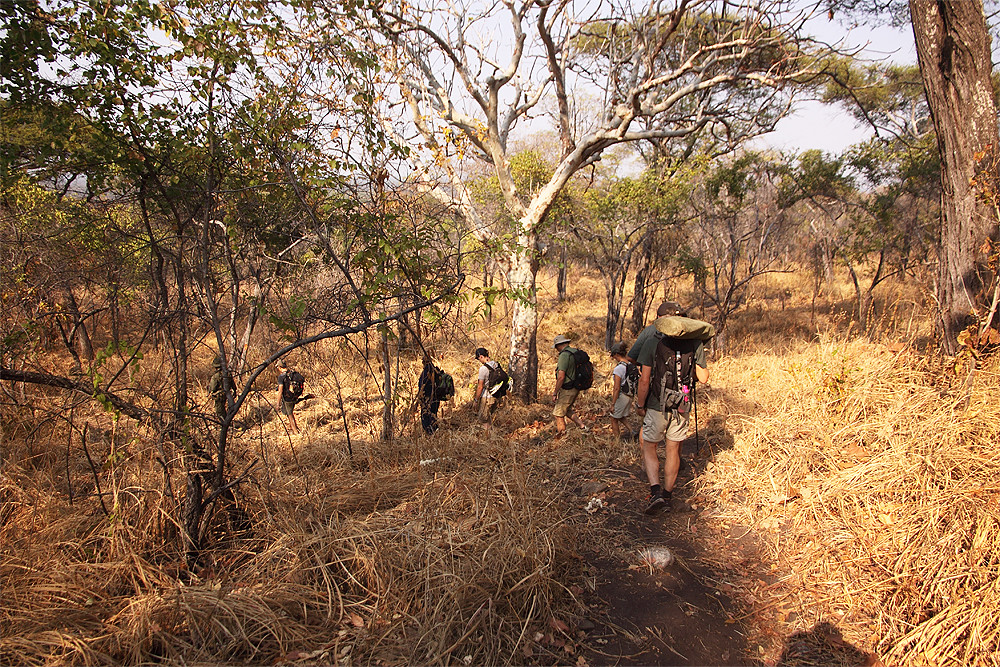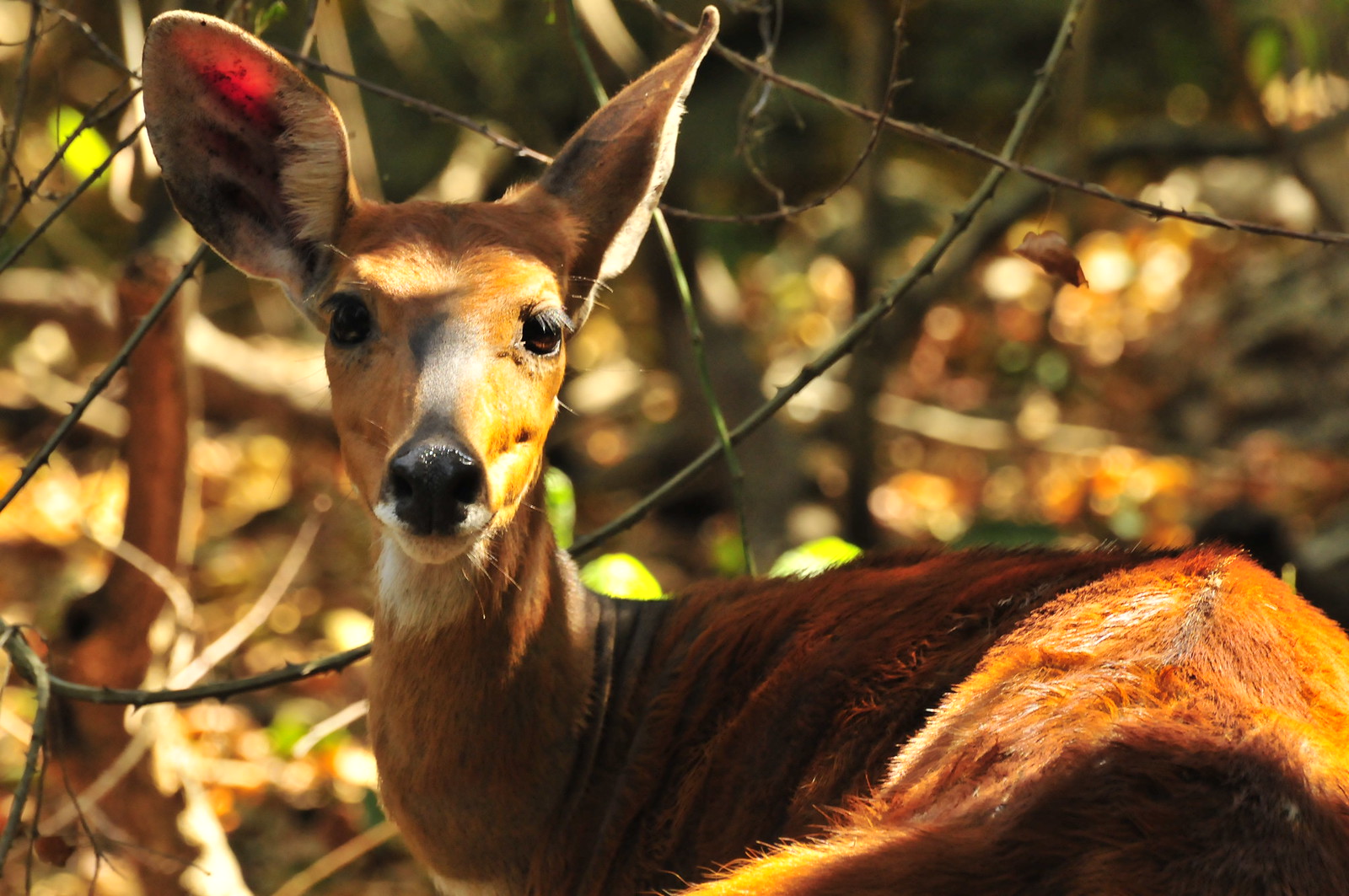Jozani Chwaka Bay National Park lies on Zanzibar Island, in Tanzania. It’s the only conserved ground on Zanzibar Island. The Park covers only 50sqkms. The park is known for having huge numbers of red colobus monkeys, or commonly known as Kirk’s red colobus monkeys. (Sir John Kirk was the first to present them to zoological science, and so they were named after him.) These are totally different from the white and black colobus monkeys that you have probably seen in other parks. The species in question is the flagship for the conservation of Zanzibar since mid-1990s. There’s more in this park to see, that is: bush babies, Sykes monkeys, the four toed nocturnal tree hyrax, Zanzibar leopard, Ader’s duiker, and Zanzibar servaline genet, 40 species of birds, 40 species of butterflies, mangrove forests, and marine organisms like various sea fish species. For all the flora and fauna in this park, it will not be surprising for it to be named a world heritage.
How to access the Jozani Chwaka Bay National Park
The park can be accessed by road transport.
You can uses private or public means. From Zanzibar to the park it’s only 35km. Visitors can alternatively take a bus from Paje town from the park. If you’re using air transport, you will connect your flight to Zanzibar, then to the park.
What to carry
On a visit to this park, you will need to carry some items considering the activities that take place in the park. All in all you will need to include the following: a pair of binoculars, long and short sleeved light clothing, warm clothing, a hat, drinking water (bottled), a mosquito net, sun glasses, snacks, a sun screen, a back pack (waterproofed), sportswear, a first aid kit, a guide book, hiking boots or shoes, sandals, a notebook, a light rain jacket, gloves, insect repellent, among others. In case there some items you forgot to carry, no need to worry for they can be hired at an affordable fee at places of residence.

Things to do Jozani Chwaka Bay National Park, Zanzibar
Bird watching tours
This activity will also be enjoyed in this park. The park has 80 species of birds and all will be at your disposal if you concentrate on it. The peak of the activity is in the early wet season. So if the main target of your visit to this park is bird watching, you may need to visit during December and January to view many of these flying creatures. With your binoculars, you will visit spot as directed by your guide, and have pleasure from what you will see. You will get to see most of the common and unique species which include, Kingfishers, African fish eagles, sunbirds, pelicans, vultures, spoonbills, among others.
Viewing wildlife on your vacation
The park doesn’t have a lot of wildlife species to see as it’s the case in other park, but it has the rare to find species in the world. These will be visible on your walk safaris in the forest or in the park. The park is a home to the red colobus monkey, African civet, sykes monkey, bush babies, and the Zanzibar leopard, that is believed not to be found anywhere else in the world. Most of what you will see will be the cute primates. You will enjoy pleasant views of them and they way of life as you take their photos.
Guided walk safaris
The small park is wonderful to explore on foot. The park has trails through which you will gain access to the different ends of the park. The main trail can take you at least an hour of leisure walking. You may decide to take several depending how much time you have. You will get to see the forest and its species. Guides will be explaining to you some of the unique plantations which are herbal too. You will enjoy the sights and sounds of birds and primates in the forest. During this walk, your highlight will be setting your eyes on the red colobus monkeys and other wild animals in the park. Some of the primates are not yet used to humans, the moment they hear humans approach, they will leap through the trees. The fact that they are not tame, you shouldn’t try to get too close to them, or even giving them food. Enjoy their presence way of life.
Cultural visits
The park lies close to locals with great cultural diversity. They are welcoming people. Their cultures have survived over years and still remain unspoiled. You will enjoy interaction s with them, and knowing their humble way of life. You may learn how to prepare their local dishes and also have a chance of tasting them. You may get a souve, nir from them as a reminder of your tour in Africa.

When to visit Jozani Chwaka Bay National Park on a Tanzania Safari
The park can be visited and enjoyed all the time in the year but the best time to visit the park is during the dry season. The dry season runs from June to October. The wet season runs from November to May. Towards the end of this season, there heavy rains that run from end of March, although they may not be constant. However both seasons have negatives and positives as elaborated below.
Dry Season (June to October)
During this season, rains are rare and the sun dominates most of the days. The grasslands in the park are short and trees aren’t so thick. The period from June to August favors animal viewing, and these can be seen along the game drives. Wildlife is easier to be seen. You can easily spot it since the grass is short.
The trails in the park are dry and passable during this season, so guided walk safaris will be enjoyable, also water activities are enjoyed too since the sun is out ( in the nearby beaches).
Mosquitoes are rare since there’s hardly any rain, and thus visitors are at a low risk of getting malaria.
The park never gets crowded.
It should be noted however that, weather can change any time. So visitors are advised to be equipped with rain coats.
Wet Season (October to May)
The season is composed of short, long and sometimes heavy rains. The best scenery in the park is during this time. The park is all green, with flowers. Wildlife can still be seen in the park, though not when it’s raining.
The season registers the peak season of bird watching when migratory birds visit the park.
This is the low season of the park, prices for tickets and accommodation are discounted.
From March, it’s very wet and some roads and trails can be hard to penetrate
What to see in Jozani Chwaka Bay National Park, Zanzibar Safari

Wildlife
The park is endowed with the rarest of wildlife that you will enjoy seeing. It’s not the big five or the most dangerous predators. This park boosts as the only one with the red colobus monkeys, Blue Sykes monkeys, Aders duiker, African civet, and if you are lucky you may catch sight of the Zanzibar leopard, that can only be found in this park. It’s also a home for, elephant shrews, bush pigs, antelopes, and reptiles like chameleons, among others. You will get to enjoy sights of these creatures during a guided walk safari in the park, or when you visit the forest.
Birds
The park is a home to birds. If you’re a bird lover, you shouldn’t forget carrying your binoculars to have a glimpse of these amazing creatures. They are always out during day although there specific places where they normally hang, and these are known to guides. You will have to spare sometime and concentrate on them to views several species. More birds from the European continent and other African countries in the early rainy season join the home birds. If you visit during this time, you will have many of them.
Sand Beaches
The park lies close to the Indian Ocean and therefore it’s a water source. There several sand beaches in the area that you can get to enjoy at the end of your safari. They have wonderful places of accommodation and they are perfect for vacation. These beaches are perfect grounds for honeymooners. As you schedule your safari, plan to spend quality time on the sea.
Accommodation in Jozani Chwaka Bay National Park
Hotels and lodges can only be found outside the Park and are categorized in terms of luxury, midrange and budget. You will need to decide the category that suits your budget. Whichever category you choose, you will have absolute comfort throughout your stay. These include:
Luxury
- Menai Bay Beach Bungalows
- Zanzibar Bay Resort
- Dhow Inn
- Kisiwa on the Beach
Midrange
- Zan Ocean Resort
- Mermaids Cove Resort and Spa
- Fun Beach Resort
- Cristal Resort
Budget
- Filawo Beach Zanzibar
- Evergreen Bungalows
- Hakuna Majiwe Beach Resort
- Maars Resort Chwaka
In conclusion, once you are set to visit Jozani Chwaka Bay National Park, plan to take some time off and visit the must-see places that lie close to the park, which include: the Stone Town, and the sand beaches.








